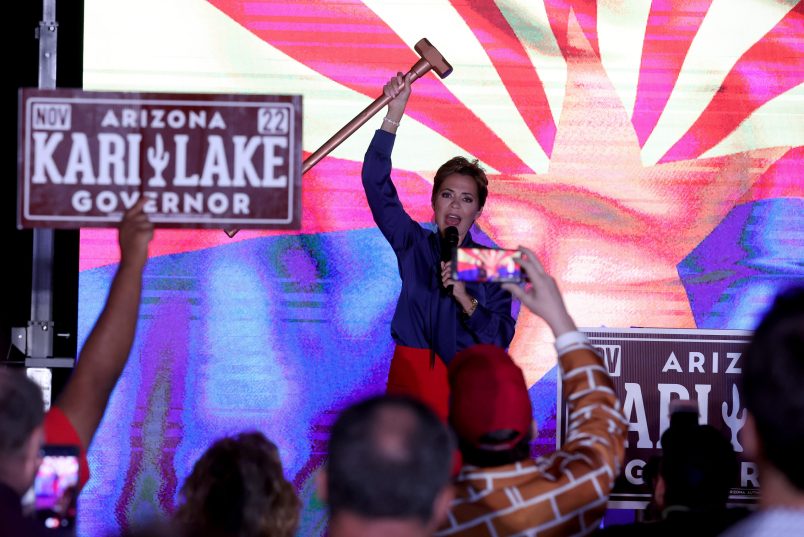“I’m going to win the election, and I will accept that result,” Arizona Republican Kari Lake said this weekend when repeatedly asked whether she’d accept the results of her election if she lost.
In a CNN interview Sunday, the Trump-backed gubernatorial candidate evaded multiple questions about whether she’d accept the results or not.
“If you lose, will you accept that?” host Dana Bash followed up with Lake.
“I’m going to win the election and accept that result,” Lake repeated.
It was an exchange that highlighted a predictable yet alarming reality: Those same candidates who have denied the outcome of the 2020 presidential election could apply the same rhetoric to their own races in 2022.
Lake isn’t alone in laying her cards on the table early. Last month, the Washington Post asked candidates in 19 high-profile statehouse races whether they’d accept the results of their elections if they lost. All 19 of the Democratic candidates said yes; only 7 of the Republicans answered in the affirmative. 12 others either said no or refused to answer—including Kari Lake.
Among those who did not respond or would not say whether they’d accept the results were Pennsylvania’s gubernatorial candidate Doug Mastriano, Texas’s gubernatorial incumbent Greg Abbott, Michigan’s gubernatorial candidate Tudor Dixon, Wisconsin’s Sen. Ron Johnson and Sen. Marco Rubio in Florida.
Lake, in particular, is running to represent a state that has become a hub for the Big Lie. It has three election deniers on the ballot for state-wide office: Lake, secretary of state candidate Mark Finchem, and Senate candidate Blake Masters, who also didn’t clarify whether he’d accept his loss.
Masters has dipped his toes in election denialism without diving right in as he tries to moderate his hardline extremism ahead of the general election. Last November, he tweeted that “America’s most powerful institutions conspired to manipulate the 2020 election,” but in early October he said that Biden was the “legitimate president” and that there was no evidence of election rigging.
New Hampshire Senate candidate Don Bolduc has taken a similarly fickle approach to the 2020 election. He’s also refused to say whether he’ll accept a loss in November, and he’s been a keen supporter of the Big Lie throughout his campaign, at several points boasting about a letter that he signed alongside 123 other retired generals claiming that the election was illegitimate.
In September he walked back his support for the Big Lie on Fox News. “I’ve come to the conclusion and I want to be definitive on this,” he said. “The election was not stolen. Elections have consequences and, unfortunately, President Biden is the legitimate president of this country.”
That answer, however, was apparently not definitive: The Republican nominee doubled back on a conservative radio show last Monday.
In the previous segment of the show, host Jeff Kuhner agreed with a caller who stated that the 2020 election was stolen: “You are right,” he said. “They stole it in the last election. There is no question about it.”
Bolduc said that he’d “heard your previous segment, and it’s absolutely true.”
He also gave a little more insight as to where his head is at. “The narrative that the election was stolen, it does not fly up here in New Hampshire for whatever reason,” he told Kuhner.
The pattern shows the extent to which Republican candidates are trying to appeal to both a conventional Republican base and the MAGA voting bloc. Election denialism may have a corrosive effect on some candidates’ campaigns, but so would breaking from Trump, the GOP’s kingmaker.
Either way, candidates’ evasiveness about whether they will concede foreshadow a tumultuous November, including drawn-out legal journeys to nowhere — and set a dangerous precedent for 2024.



